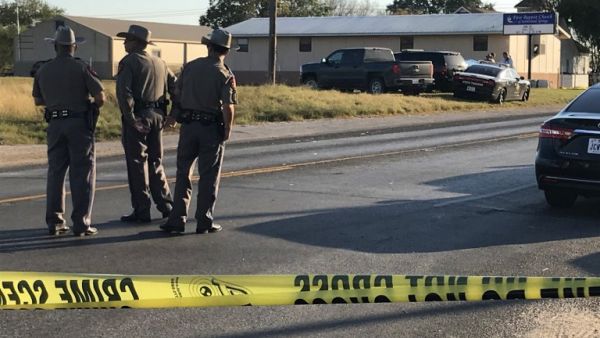by Rosie Alfatlawi
After 26 churchgoers were shot dead by a white man in Texas on Sunday, many have pointed out a double standard in the U.S. president’s response.
Coming so soon after Uzbek Sayfullo Saipov killed eight in New York less than a week ago, the killings have offered the opportunity for a direct comparison between the two.
Donald Trump responded to last week’s fatal attack, carried out by a Muslim and labeled as terrorism, by quickly tweeting to demand a change to immigration laws.
The terrorist came into our country through what is called the "Diversity Visa Lottery Program," a Chuck Schumer beauty. I want merit based.
— Donald J. Trump (@realDonaldTrump) November 1, 2017
The United States will be immediately implementing much tougher Extreme Vetting Procedures. The safety of our citizens comes first!
— Donald J. Trump (@realDonaldTrump) November 2, 2017
In stark contrast, on Sunday he tweeted simply to say “I am monitoring the situation from Japan,” where he is currently on a tour of Asia.
May God be w/ the people of Sutherland Springs, Texas. The FBI & law enforcement are on the scene. I am monitoring the situation from Japan.
— Donald J. Trump (@realDonaldTrump) November 5, 2017
At a later press conference from Tokyo, he added “this isn’t a guns situation,” emphasizing that he believed the shooter had a “mental health problem at the highest level.”
“Fortunately somebody else had a gun that was shooting in the opposite direction, otherwise it wouldn’t have been as bad as it was, it would have been much worse.”
It is not clear whether he based his claim that shooter Devin Patrick Kelley was mentally ill on fact, or whether it was pure speculation. Either way, it seemed as if he began making excuses for Kelley almost as soon as he demanded the death sentence for Saipov.
Trump’s rhetoric suggests that, as following the Las Vegas shooting last month, he will again avoid any debate on implementing greater gun control in the U.S.
At that point, when asked on a visit to Las Vegas if he would be implementing legislative change on guns, he said:
"We're not going to talk about that today," he responded. "We won't talk about that."
Many pointed out the “hypocrisy” between Trump’s inaction here and his prior enthusiasm to act in response to the New York attack, which was classified as “terrorism.”
From where did the #Texas shooter come from? Shall we ban him? Shall we ban people who look like him from owning guns? https://t.co/HX1ktSTR17
— Kurt Bardella (@kurtbardella) November 6, 2017
This, of course, is a reflection of Trump’s political concerns. Spreading fear of Muslims and “Islamic terrorism” appeals to his supporters; challenging gun ownership would risk angering the powerful NRA lobby.
As CNN wrote last month: "Trump is more than willing to seize on tragic events when they confirm his previous political and policy beliefs. He will effectively ignore them when they don't."
In fact, it seems that Trump and his ilk have shaped the debate by making the term “terrorism” the benchmark for deciding whether violence should be acted upon or brushed under the carpet.
This was reflected in the aftermath of Sunday’s shooting when, as with the Las Vegas attack, many immediately demanded to know why it had not been labeled an act of terror.
I take it the Texas shooter probably wasn't brown or a Muslim because I've yet to hear the media say anything about an act of terror.
— Themaskedasshole (@Tmaskahole) November 5, 2017
- ‘Allahu Akbar’ and the New York Attack: Context is Everything
- Here's Why the Vegas Shooter Is Not Officially a Terrorist... Yet
In recent times, “terror” has popularly taken on gravity as the catch-all term for killings of civilians on a large scale. “Terrorists” seem to have gained a monopoly on bad violence.
Yet, terrorism has specific legal definitions which vary between systems, but usually involve violence with an explicit political purpose.
That has not been found to be the case with Vegas shooter Stephen Paddock, nor so far with Kelley, although that could change.
Not all mass murderers are terrorists. In the U.S., the vast majority are not, and shootings by white Americans driven by revenge, madness or other motives and none are much more common and kill many more annually.
Many have pointed out that addressing the thorny issue of who is allowed to own a gun would be a much more effective way of preventing such tragedies than heavy-handed and discriminatory immigration policies.
Aurora: AR-15
— Michael Skolnik (@MichaelSkolnik) November 6, 2017
Orlando: AR-15
Las Vegas: AR-15
Sandy Hook: AR-15
Umpqua CC: AR-15
San Bernardino: AR-15
Sutherland Springs: AR-15
he perceived need to call violence terrorism in order to reflect its depravity is in itself a concerning reflection of the way politicians like Donald Trump overemphasize the terrorist threat while downplaying other forms of violence, at least when it conveniences them.







